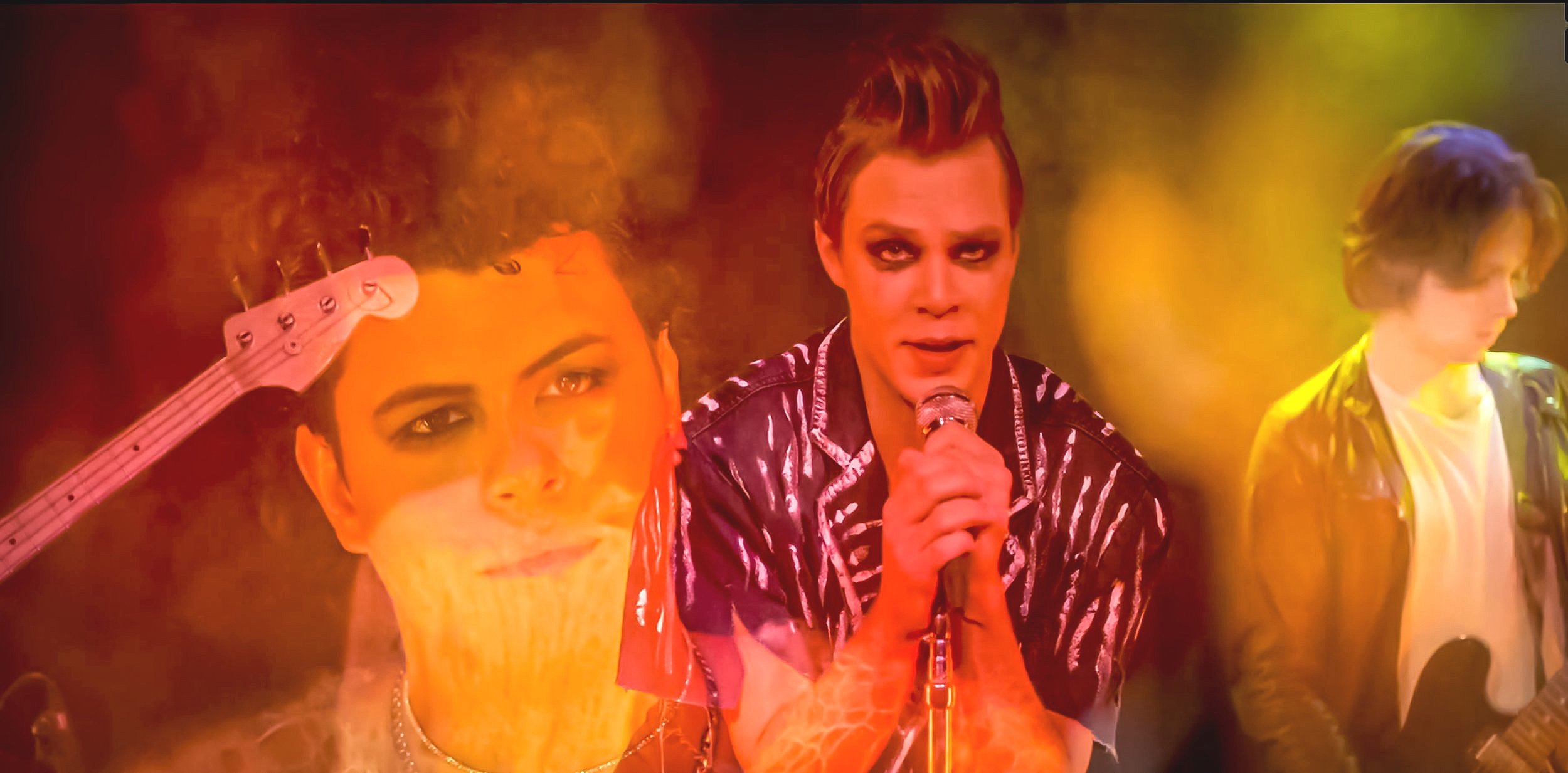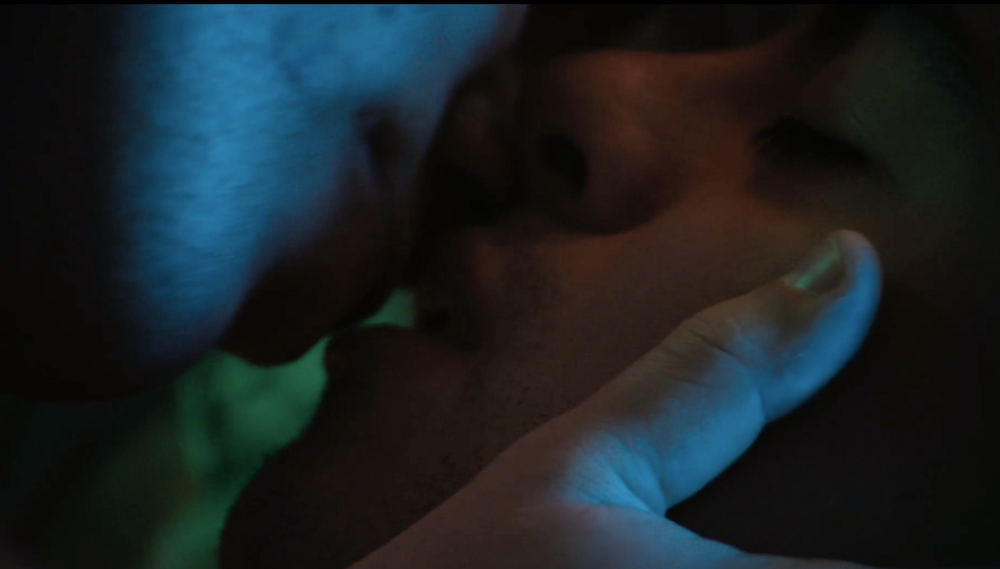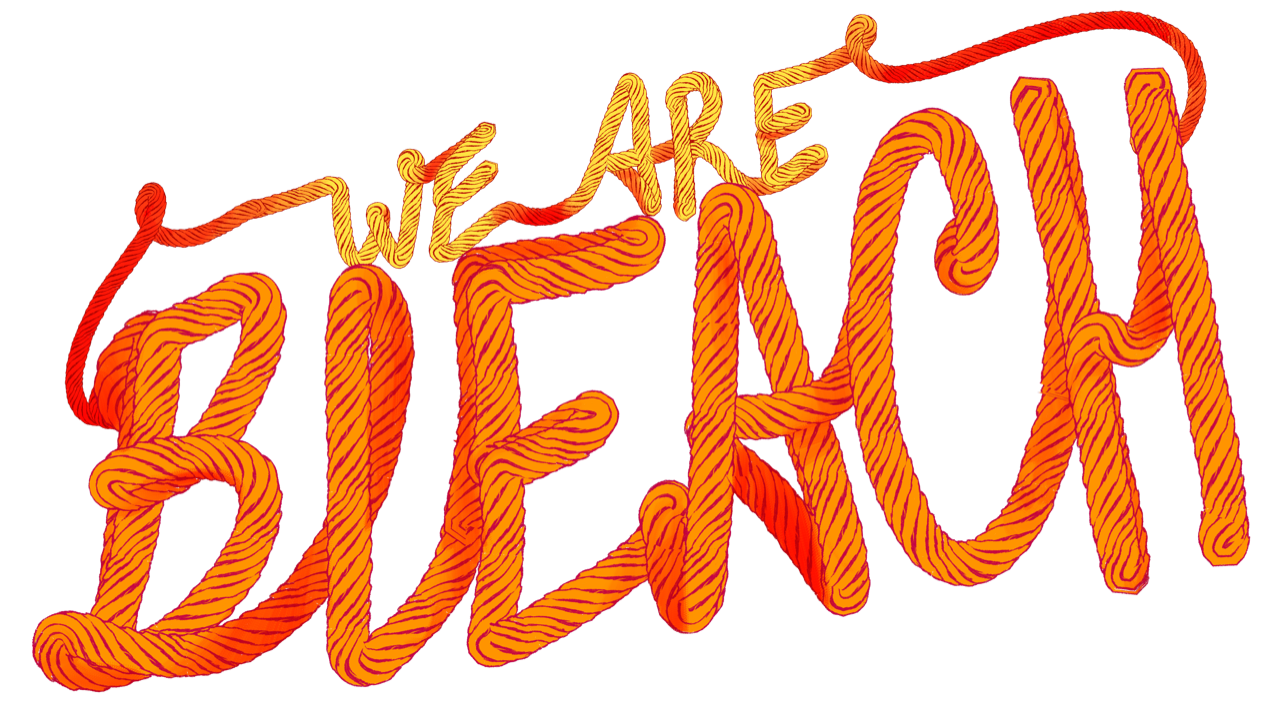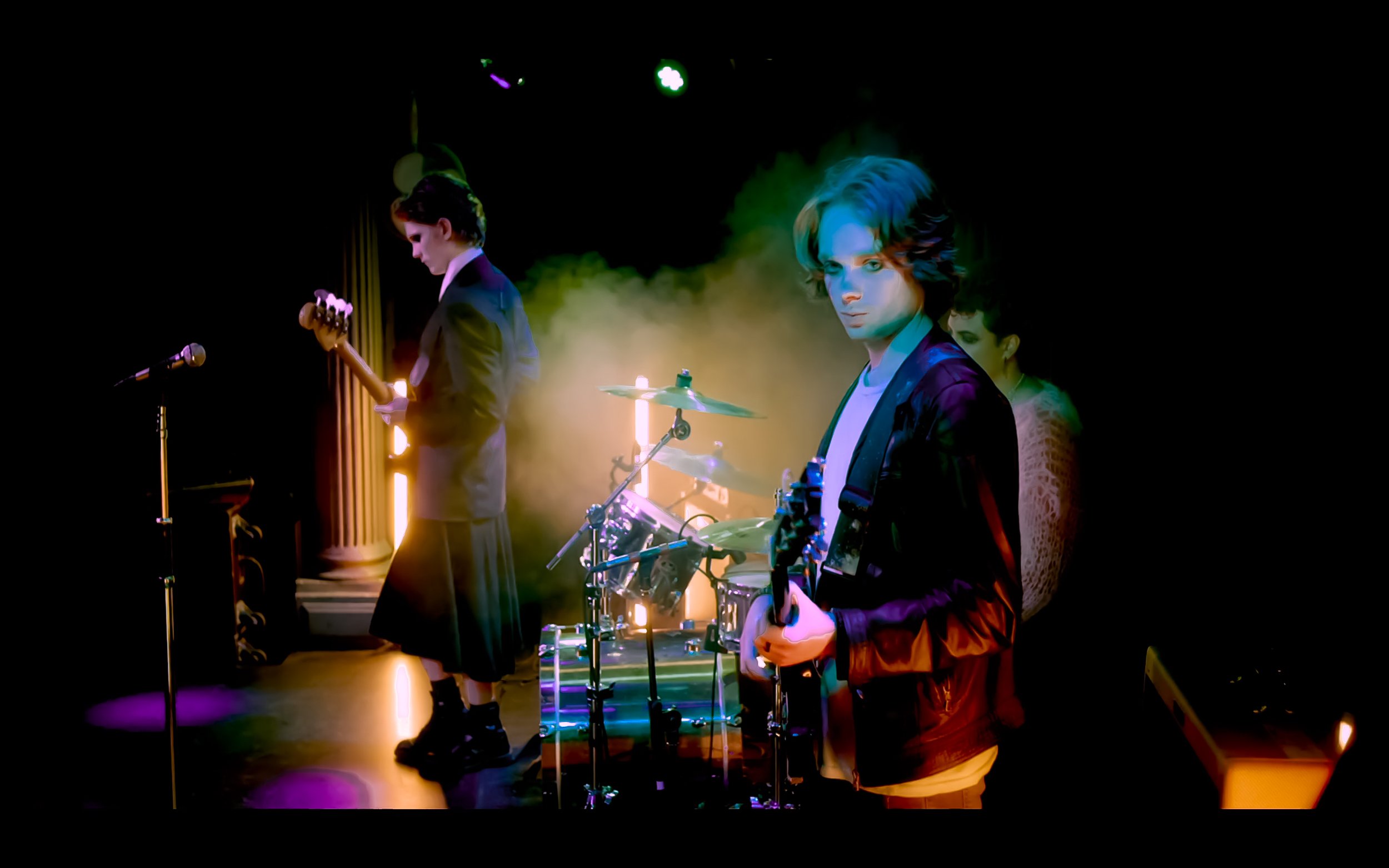
The pansexual lead singer of aN up-and-coming London rock band flirts recklessly, threatening to destroy the love that is right in front of him
BIO
Zoë Greenbaum is a writer/director, visual artist and singer/songwriter working in film, fine art, manga and comics (in both Japanese and English) and storyboarding
We Are Bleach, starring Zachary Goldman and Sonnei Garces, in which Zoë plays the third lead, is her first independent film as a London-based director, as well as her acting debut.
Set in London, We Are Bleach is the story of two young, punk rockers working to find their way through a complex and often toxic relationship. The film was conceived as a star vehicle for the young British actor, Zachary Goldman and co-stars the wonderful American actor, Sonnei Garces. The original songs and score were written by Oliviero Forni with lyrics by Zoë, and Zoë is also the vocalist on Poison & Gasoline.
When she is not making films, Zoë is collaborating with the multi-awarded EMF songwriter and guitarist, Ian Dench, on a forthcoming EP for their new band,The Green Bombs.
To learn more about Zoe: www.ZoeGr.com
Zoë Greenbaum

Director’s Statement
What’s a Nice Girl Like You Doing Making a Movie Like this?
Before coming to London in 2019 at the age of 24, I lived in Kyoto, the old capital of Japan for 5 years. I moved there when I was 19 to go to Kyoto Seika University and study gag manga (comedy based comics). Kyoto is famously an ancient city full of Shinto shrines and Buddhist temples and certain parts of the city have remained largely unchanged for more than hundreds of years. However, the majority of the city was built in the post-war period and, despite Japan’s reputation for being very tech-savvy, Kyoto, like most non-Tokyo places, has a very “if it ain’t broke, don’t update it” attitude towards new technology. I can’t speak to the Kyoto of 2022, but in 2019, it was still like a time-machine to the 1980s. I would walk around with my headphones on listening to Eurythmics or Pet Shop Boys or The Smithereens or Elvis Costello or The Cars and pretend I was a time traveler just passing through.
Kyoto Seika is one of Japan’s most renowned art schools, but, despite it’s being a very serious professional program, it is also a total hippie school. For instance, a typical day on campus may involve a bunch of students blowing 5 ft long bubbles with a giant apparatus in the middle of of the quad. For the school festival, everyone goes all out, there are always drag maid & butler cafes, Jojo’s Bizarre Adventure cosplayers, and, of course, about 80 different bands playing.
During my tenure, the bands were all under the auspices of two rivaling music clubs: the “Light Music Club” and the “Folk Song Club,” both completely ironic names for clubs that housed a couple dozen punk and garage rock bands. It was my childhood dream to be the lead singer of a band, so I immediately set out to join the Folk Song Club, as the Light Music Club somehow had the reputation of being a little on the phony side—clearly, a smear campaign at work.
To join a club, you had to go through the process of being recruited by very eager people who will generally lose all interest in you the moment you officially sign up with them. During my 5 years at Seika, I was briefly in several clubs, including but not limited to The Flamenco Club, The Kendo Club (on account of there wasn’t an archery club), and, most briefly of all, The Folk Song Club.
I remember my recruitment very well: a group of pretentious Music and Anthropology majors (in other words, the cool kids) sat down with me for lunch in the cafeteria (we were probably eating either chicken nanban or Chinese style ramen) and I was surrounded by a group of smirking, slightly older kids in a lot of loose-fitting black clothing who were telling me just how edgy they were.
So I asked them what makes them edgy. They told me…”well, we are edgy! We have a reputation.” And so I replied, “In what way are you edgy, though?” Which was answered in a similar style. So I asked them if they did drugs and they said no, I asked them if they did any weird sex stuff and they said no, and I asked them, in that case, what exactly makes them edgy? And one of them replied, “Well…we just are!” (This was all in Japanese, of course.)
One member then, seeing that I doubted entirely their street cred, proceeded to explain to me that one of the very edgy things they do is to impose nicknames on their recruits. He then introduced me to a girl who very proudly introduced herself as “Bondage.” I asked her if she did bondage and she told me of course not. I looked around at everyone else and it was clear that not doing S&M was a universal theme here. But, to be honest, The Folk Song Club’s desire to be edgy in and of itself was already too edgy for me. It didn’t last with them, naturally.
Now that I live in London, I am regularly regaled with tales of drugs and orgies and drug orgies that I never asked to hear (team blue pill for life—or maybe purple pill, where I’m only enlightened to the truth if it’s a truth that I might like). Life here is truly too edgy for me, someone who yearns for days of reading manga and drinking herbal tea in cafes that played light Bossa and Art Blakey. And yet, despite all of this, I went out of my way to make a movie about alcoholic, implicitly using, nymphomaniac punks in the London underground music scene. Why might that be? Well, there are several reasons, let me count the ways…
First of all, in case I hadn’t made it abundantly obvious, I love music. My first favorite album was Nina Hagen’s Fearless, which I had on tape when I was 5 years old. My mom gave me all of her old tapes and I turned down James Taylor, Depeche Mode, and The Talking Heads — what can I say, they just weren’t Nina.
Fearless has consistently remained one of my absolute favorite albums over the years. Nina Hagen’s aesthetic, both musically and in her performance, the color of it all, the iconoclasm, the genre-warping hurricane of sound, and the sheer anarchy she embodies have always been a major influence on me.
I grew up with Baby Boomer parents; my mom spent her youth at The Fillmore East and The Mud Club and her music was always integral to my life. Having two parents who are musicians means two things for me: 1) that music is an obviously integral part of my life, more so than I could ever consciously understand and 2) I really, really need to do something for work that isn’t music—for my sanity. Somehow, people were always singing and dancing in my manga. Now that I make films, the characters are still singing and dancing, but you can hear it and they move. So I need music in everything I do, but I need what I do to be, primarily, not music.
When you grow up loving rock music and you’re born after the 80s, you’re haunted by tales of talented and amazing people and their countless, unnatural deaths. I grew up feeling so close to all of these dead legends, like they were my lost friends, and acutely aware of the darkness that always accompanies the light. I feel like I absorbed these ghosts and their stories and now they just come out of me when I go to write.
But, of course, the most common thing you hear people say about any iconic rock musician is, “he was a complicated man.” What does that mean in a practical sense? What does that mean in a storytelling sense? Some people might throw around the word antihero, but I feel that discussing people this complicated in storytelling terms is reductive. Slice of life fiction pertains to the mundane, to what is relatable, moment to moment, but generally, to what is broadly relatable. It does not often attempt to address what real life is like for people living lives that fall outside of the general criteria of “normalcy.” Indie rock musicians, for example, are not living lives that are recognizable to people who identify reality as The Mindy Project.
In the year that I was in film school, I met some of the worst, most duplicitous, and phenomenally colorless, people in my entire life. Stuck in a half-virtual, half-live universe with them - in the midst of a global pandemic - in a foreign country, scammed by my first landlord, with “friends” who were too busy drinking and partying to help or care, and my school administrators too ill-equipped and undermining to imagine that they should be helping, I did the best I could. For my career, for this non-music thing that I needed to create, it was important, or so I thought, that I stick with it. I came to London because I love British film. I was following in the footsteps of Stanley Kubrick. Breaking into film on my own was clearly impossible, but the film school scenario kept darkening into a hellish nightmare that had no end.
The few seeming friendships that I had forged ended in ugly ways that still haunt me. Bleach was, in part, a way of purging them. Sky, the compulsive liar, the narcissist, the party animal became an accidental composite of two of those “friends.” April, beautiful to look at, but not necessarily a lovely person, leads Sky on at the same time as she shuts him down. Tom, the poet, the empath, is neither the good guy nor the bad guy. He just is.
“Writing Bleach was a way of forcing closure and it worked.”
What defines the characters in Bleach is how familiar they are. They aren’t the finest people, far from it, but they’re real. Their struggles, their depth, their stories and their superficialities are all recognizable and authentic. The crises in the plot have nothing to do with the instability of the characters’ lives and everything to do with their personalities. And because of the way the film is structured we don’t have time to judge them, we just see them, and watch them. They hurt themselves and each other, and what might scar for years, disappears in seconds.
I dropped out of the unending nightmare that was film school in the Autumn of 2021. I was sick of people telling me what was good taste or bad taste, how movies should be “simple stories told well,” what to think, how to feel, and what to believe. I did my undergraduate work in Japan where no one ever told me that my taste was wrong. My teachers would look at my work and tell me, “this is probably never going to sell, but keep doing anyway it because it’s interesting,” and that was good advice.
In many ways Bleach is an expansion of the gag manga I used to write. It’s a lot less funny, but it’s part of the same universe. Bleach races along - head down - under dark glasses, a cross between 2D and 3D. The more that I embrace the chaos and the grittiness that I’ve always tried to keep out, I am like Bleach’s lead, Sky: “I can see just fine.” When I left film school, I lost my visa, my student loans, and my apartment, and, in losing everything - in sacrificing everything - I gained the freedom to create this film.






